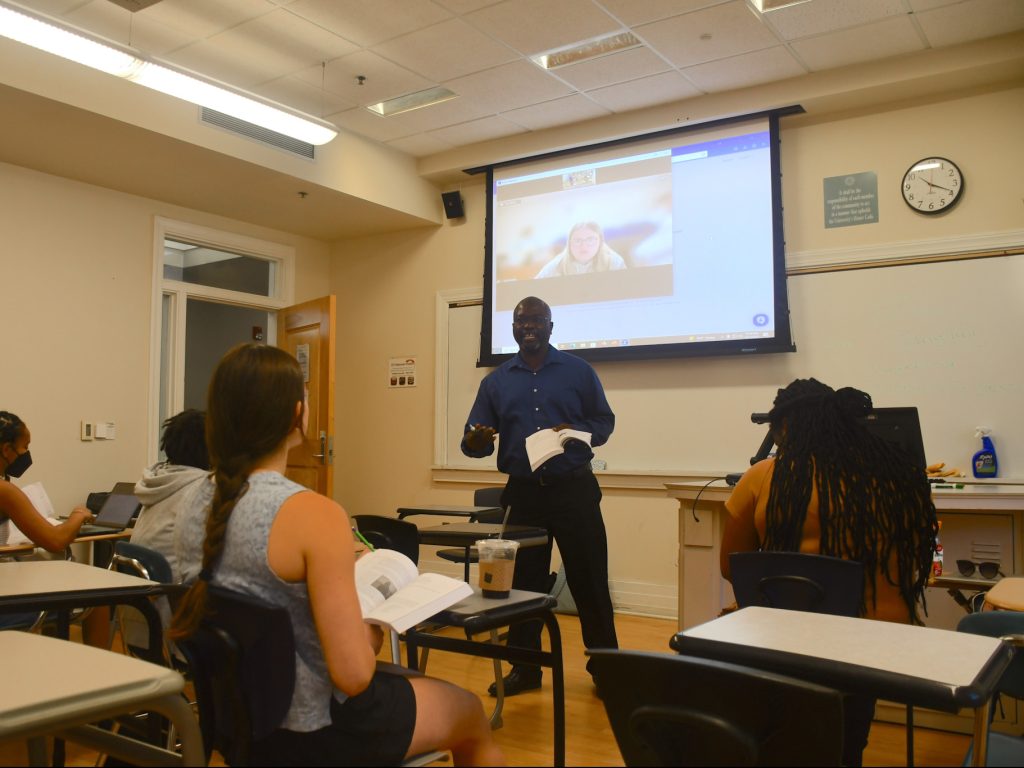
Hundreds of Tar Heels are sharpening their language skills on campus by connecting with students abroad through Collaborative Online International Learning (COIL) courses.
UNC-Chapel Hill offered 30 COIL courses in the 2022-2023 academic year, including eight language courses.
“The COIL pedagogy is particularly effective for language learning, with students improving both their speaking and comprehension skills and their cultural understanding by collaborating with students at the global partner university,” Sharmila Udyavar, associate director for global education, said.
Yi Zhou, advanced Chinese I professor, received a Curriculum Development Award for COIL from the Office of the Vice Provost for Global Affairs (OVPGA) to teach a course in collaboration with Tianjing Normal University professor, Samantha Shi. Whether they are studying at Carolina or in China, Zhou believes each student benefits from COIL.
“This is a great opportunity for students to learn in an immersive environment with native speakers,” Zhou said. “These native speakers are also college students, they are similar ages and they have something in common, so they have a lot of topics to talk about when they meet. They learn the language in the classroom, and they have the opportunity to apply what they learn to the real situation.”
While learning a new language can be difficult, Zhou said that her students typically “know how to respond naturally by the first or second meeting,” with their partner students.
Mohamed Mwamzandi, teaching associate professor, instructs Elementary Kiswahili II in collaboration with a professor at Pwani University in Kenya and has seen firsthand the benefits that COIL brings to language courses.
“Before incorporating COIL, students said they were missing the conversation aspect of language learning,” Mwamzandi said. “They felt like they learned more through COIL, and we notice the change. There was a big difference between what my students in the previous courses would do and what these students are able to do because of COIL.”
Students not only walk away with improved language skills, but they also pick up deeper cultural understandings along the way.
“My small group got to know our Bejing partner, Li Ye, on a deeper level,” said Brianne Wood, former student of Zhou’s CHIN 305 course. “We learned about her daily life as a student in China, and how this compared to our own lives as students in the United States. Overall, I feel as though I have gained a new perspective from this course on cross-cultural collaboration, along with improving my language skills.”
Wood is one of many COIL participants who have developed a more nuanced perspective on what life is like in their partner country, according to Zhou and Mwamzandi.
“You may learn a language, but you may not know the cultures of those people,” Mwamzandi said. “Now, students say they have a better sense of the Swahili culture and generally east African people after they have conversations with their partners. They know what these people actually look like, what they eat, where they live, what they like and what their challenges are.”
No two COIL courses are alike because each course is specifically designed by a Carolina faculty member and their global partner to meet the learning objectives of both courses. Mwamzandi’s course is structured so that each UNC-Chapel Hill student is partnered with a student in Kenya and given activities and assignments that they must complete together, whereas Zhou’s course has a specific project that the entire class works on throughout the semester.
“Students work in a team, and the Chinese students help our students translate children’s books,” Zhou said. “For the final presentation, the UNC students tell the story from the translated books, which are then donated to the children’s museum.”
Both Mwamzandi and Zhou expressed how proud they feel watching their students effectively communicate with native speakers and grow their cultural understanding.
“While I did feel challenged by communicating with native speakers at a fluent level, this challenge was an immersive environment that helped my Chinese improve, and with an open mindset could easily be navigated,” Wood said. “I feel very accomplished after this semester.”
UNC-Chapel Hill faculty interested in incorporating COIL in an existing or new course are invited to apply for COIL Curriculum Development Awards and graduate assistant support. OVPGA staff and COIL Faculty Fellows are available to consult on COIL course design. Applications are due Oct. 15 for UNC-Chapel Hill courses taught in spring, summer and fall 2024.
By Madison Horn, UNC Global
